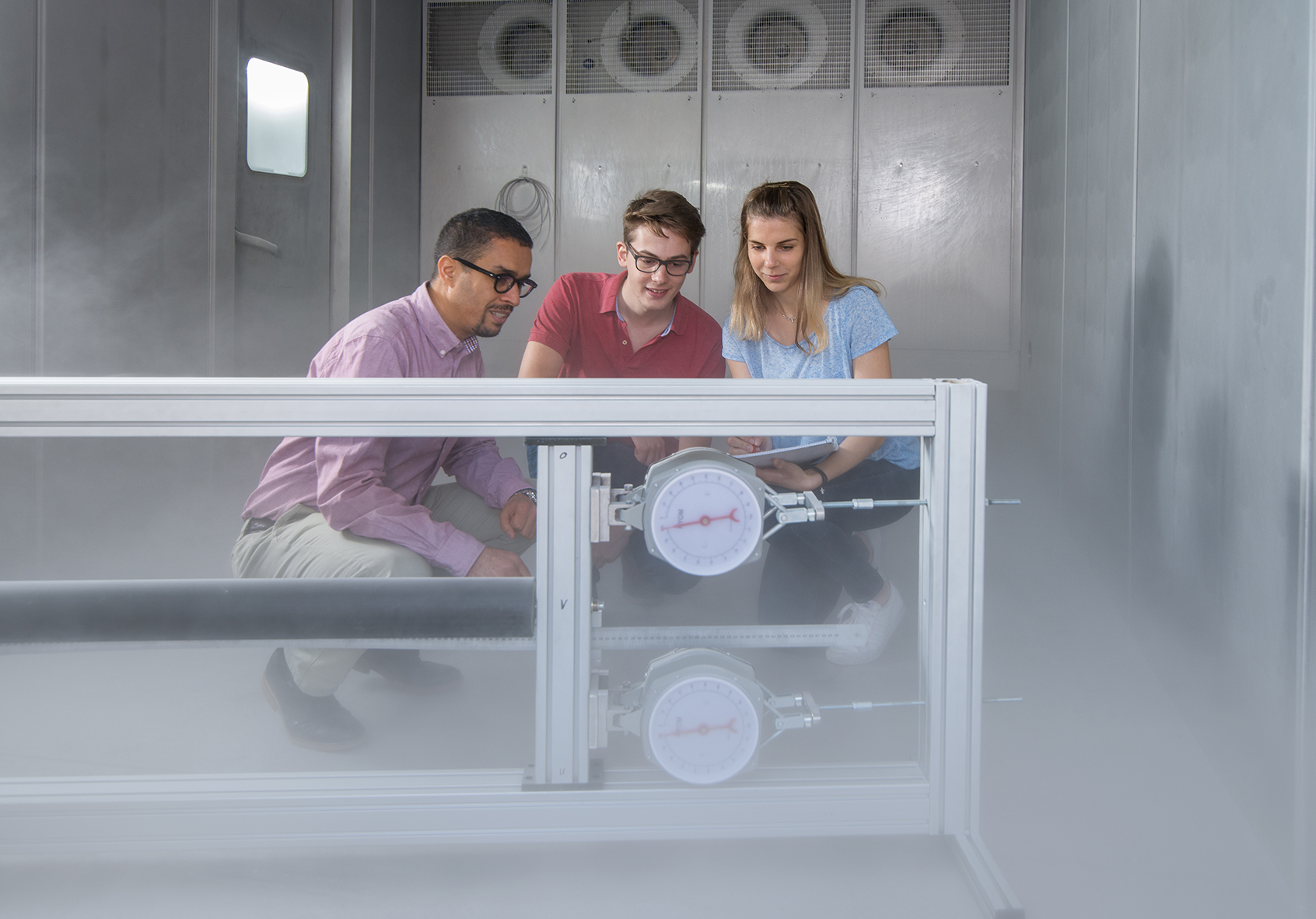
KKU major
Bachelor programs in mechanical engineering and mechatronics
The Faculty of Mechanical Engineering and Mechatronics offers the Refrigeration, Air-Conditioning and Environmental Engineering (MSE) major in the following courses: Bachelor of Engineering (B. Eng.)
- Machine Engineering
- Mechatronics
In the future, energy requirements must also be greatly reduced in refrigeration and air conditioning systems. However, there are no or hardly any engineers with the necessary mechatronic and refrigeration knowledge. Therefore, students majoring in MSE have very good career prospects.
They acquire knowledge in promising and innovative fields of refrigeration, air conditioning and environmental technology and can contribute to the development of environmentally friendly processes. Students are allowed to participate in current research and development projects. Free membership in the German Refrigeration and Air-Conditioning Association (DKV) also helps them to gain an insight into the field of refrigeration and air-conditioning. (DKV) helps them to build up a very personal network.
Refrigeration and air-conditioning
Since time immemorial, humans have sought to temper their environment as well as their food. Caves were warmed by fireplaces, meat preserved by cooling in snow.
For thousands of years, the focus was on heating, but since Roman times, there have also been efforts to cool rooms in a targeted manner, which is now paraphrased as "air conditioning technology." Air-conditioning systems, which in addition to heating are also capable of cooling as well as humidifying and dehumidifying, have only existed for about 100 years.
Refrigeration technology is used in many areas of technology and everyday life, such as the cooling of food, air conditioning in buildings and vehicles, and computer cooling.
Today, air conditioning is used not only in office buildings, homes and automobiles, but also in operating rooms, theaters, shopping malls, aircraft and spacecraft, railroads and more.
Environmental Engineering
Environmental engineering is a typical cross-cutting technology in which a wide range of scientific and engineering principles have practical applications. Some typical fields of environmental engineering include:
- Wastewater as well as process water treatment and reuse through the use of various technologies, such as biological treatment and filtration techniques
- Exhaust gas and exhaust air purification in automotive and industrial applications
- Waste management and recyclables recycling
- Eco-balance sheets and eco-management
- New technologies in energy engineering, such as the use of fuel cells
Master's degree in mechanical engineering
Energy efficiency is the key to a continued high standard of living with dwindling fossil fuels and reduced CO2 emissions. The demand for graduates has been very good for years. Even in the economic crisis of 2009, there were no unemployed refrigeration and air conditioning graduates from Karlsruhe University of Applied Sciences.
Possible, later employers are:
Planners, manufacturers, builders and operators of large refrigeration and air conditioning systems, heat pumps and combined heat and power plants, component manufacturers,
also vehicle manufacturers and their suppliers, energy suppliers
Content taught for all new master's programs:
- Selected chapters d. Engineering Mathematics
- Personnel Management
- Introduction to scient. Working
- Software engineering
- Control and measurement technology
- Heat transfer
- Modeling and simulation
Focus on energy efficiency:
- Energy transmission & energy storage
- Regenerative energies
- Simulation of thermal systems
- Aerodynamics / CFD
- Alternative refrigeration and heat pumps
- CHP / CHP with laboratory
- Control of refrigeration and air conditioning systems
- Energy efficiency in refrigeration and air conditioning
The Energy Efficiency major begins each winter semester. Application deadline for this major is July 15 of the respective year.
After completing the master's degree in mechanical engineering with a major in energy efficiency, graduates are:
- Ability to apply extensive scientific and technical knowledge (e.g., in the areas of mathematics, engineering mechanics, heat transfer, and numerical computer-oriented methods) to evaluate and develop complex mathematical, mechanical, mechatronic, and thermal systems and processes
- Ability to model, analyze, and evaluate complex thermal systems
- Ability to analyze and evaluate power generation and distribution chains
- Ability to design, analyze, and evaluate renewable energy systems and combined heat, power, and cooling systems
- Ability to design efficient control systems for refrigeration and air conditioning systems
- You will be able to design and operate refrigeration and air conditioning systems in an energy efficient manner and optimize existing systems for energy efficiency
- They have in-depth knowledge in the field of heat pumps and alternative refrigeration.